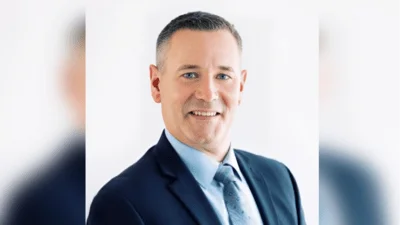Belleville Memorial Hospital issued the following announcement on Sept. 22
Nov. 11, 2020 is a day 54-year-old Amy Lojan of O’Fallon, Illinois, vividly remembers. Until it turned foggy. It was Veterans Day, and the special education teacher with Mascoutah School District planned to run errands on the school holiday.
While things had been feeling a little off recently, she had convinced herself that the misstep exiting her laundry room was her body reacting to a combination of stress, fatigue, and effects of wearing bifocals while staring at the computer screen. But when her left hand didn’t want to type on the keyboard the day before Veterans Day, she was alarmed and thought she may have suffered a stroke.
Wednesday morning, feeling normal, she got in the car and headed out to run her errands. “I went to grab a shopping cart,” says Lojan. “My left hand wouldn’t do what it was supposed to do, just like Tuesday. It’s hard to explain, but my mind knew what my hand was supposed to do, but it wouldn’t move. I couldn’t grab the cart.”
From the store, she called her husband, Mike, at work and a couple friends who were close by. Her friends picked her up and drove her to the emergency room at Memorial Hospital Shiloh, where Mike met them. That’s where things happened quickly.
“The ER was very responsive,” says Mike Lojan. “Amy had an MRI and they had her diagnosed with a brain tumor (glioblastoma) within a short time. They knew it was a tumor but not all the details.”
Within a few hours of leaving the house that morning, Amy Lojan was in an ambulance en route to Barnes-Jewish Hospital. “They took me into a room, and everything after that is foggy,” she says. As were the next several weeks.
Following extensive testing, a nine-hour surgery Nov. 13 to remove the tumor, an inpatient stay, and inpatient rehab at The Rehabilitation Institute of St. Louis, Amy Lojan returned home on Thanksgiving Day. Thirty rounds of weekday radiation treatments started in late December, treating the tumor, but taking a physical toll.
A physical therapy journey
Walking is something Lojan no longer takes for granted. Neither is pushing a vacuum. “I can’t drive anymore, so I can’t take Joey (the Lojan’s 12-year-old son) to school or soccer practice. I can do laundry and vacuum, though. I’m just slow and sloppy,” Lojan adds with a laugh.
Therapists at Memorial Hospital Rehabilitation Services in Shiloh are working with Lojan to regain some of these former functions through physical and occupational therapy. The number of cancer patients Memorial Rehabilitation Services treats has increased since Siteman Cancer Center opened on the hospital campus in January 2020. Many of the therapists have received additional training to work with these patients.
“We evaluated Amy’s balance and challenge her with exercises that enhance her abilities to negotiate more challenging types of scenarios with walking,” says rehab supervisor Bridget Whiteside, PT, DPT. “When there is impairment with neurologic function, a patient cannot always respond easily to subtle changes in terrain when they’re walking, which can increase their risk for falls. We try to mimic situations that enable her to adapt, and demonstrate strength, reaction time and coordination to keep her safe.”
Lojan’s tumor affected her proprioception, which is the awareness of the position and movement of the body. It’s walking without having to think about where you are placing your foot. The therapists are helping her to retrain her brain.
“It’s how your body is in space,” explains Lojan. “Kind of like knowing what my left hand needs to do, being purposeful about where I’m putting it. I have to think about what I’m doing and tell my hand what to do.”
The therapy is also boosting Lojan’s confidence.
“When you’re in the hospital, and everyone wants to do everything for you to help, it messes with your confidence,” Lojan says. “I need to know, ‘Can I still walk and can I still pour cereal?’ The therapists are helping me with these basic life skills.”
While she feels she’s making progress, she has a long way to go. She’s enrolled in a clinical trial at Siteman Cancer Center. She wears the Optune device for 17-18 hours a day, which creates electric fields to disrupt cancer cell divisions in her brain. And the physical and occupational therapy continue.
Despite some limitations, Lojan has found the something that gives her a much needed mental and physical boost — a daily walk. “Since I can’t drive anywhere, walking is the only thing I can do for myself, by myself. And I wear my Road ID GPS, so people know where I am.”
Learn more about the support Amy received through the comprehensive rehabilitation services team.
Original source can be found here.

Source: Belleville Memorial Hospital






 Alerts Sign-up
Alerts Sign-up